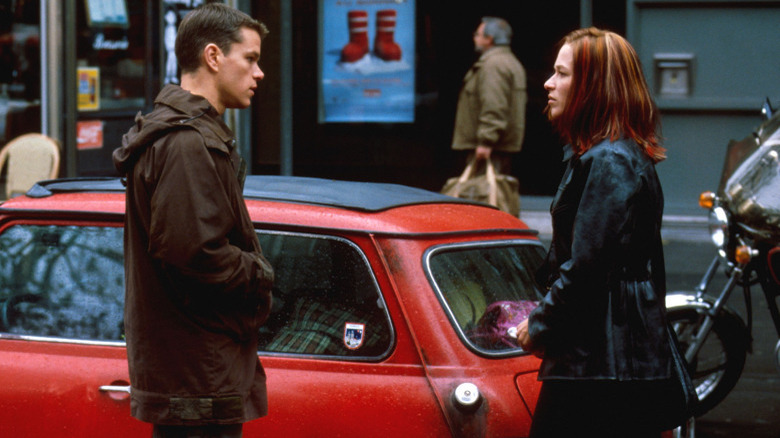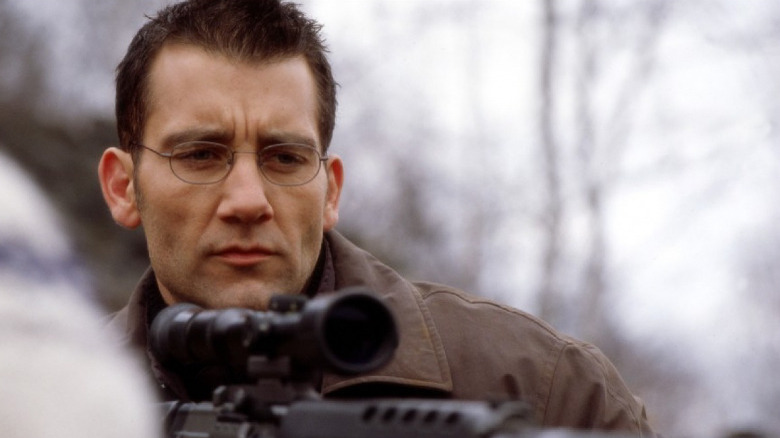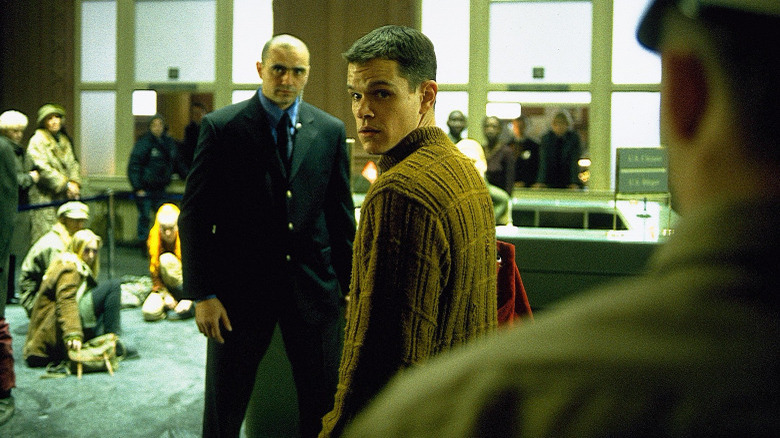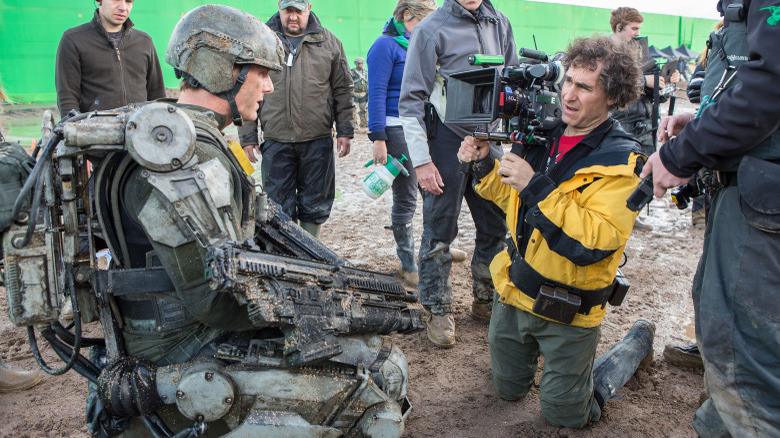The Behind-The-Scenes Chaos That Created The Bourne Identity
There are many directors who like to know exactly where they're going with a film before kicking off production, planning things out to the tiniest detail. Doug Liman, however, is not one of them.
"I'm really interested [in] going on an adventure, and going to parts unknown," Liman told /Film in 2017. He was talking about what led him to direct "American Made," a movie based on the hard-to-believe exploits of real-life commercial jet pilot-turned CIA and Colombian drug cartel smuggler Barry Seal. Liman also talked about "Edge of Tomorrow," an earlier film he'd collaborated on with "American Made" star Tom Cruise. "On 'Edge of Tomorrow,' we discovered that movie while we were making it. That's why I love working with [Cruise] so much," said Liman, recalling how he horrified a producer by confessing he had "never made a film like this before" just prior to starting production.
Setting aside the privileges Liman clearly enjoys as a white cis-male director, his organized chaos approach has worked more often than it hasn't. This goes all the way back to his well-received low-budget comedies "Swingers" and "Go" in the late 1990s, before making the jump to the world of big-time studio fare with 2002's "The Bourne Identity." A critical and box office hit, Liman's action film successfully re-styles Robert Ludlum's Cold War-era source material as a post-9/11 thriller, tapping into the political disillusion of the early 2000s. It was also a highly stressful shoot that even saw its director pull a Bourne by going rogue at one point (in his own, adventure-seeking way).
'I was about to cry'
In an article examining Liman's creative process published by Variety in 2008, the director talked about his "Bourne Identity" pitch, explaining:
"Normally, the action is just a gratuitous thing. In the case of 'Bourne,' he was going to learn about himself in the action scenes."
All seemed to be going well at first, with Liman acquiring the rights to Ludlum's source material and hiring Matt Damon to play the amnesiac assassin who goes by the name of Jason Bourne. It was only after Universal's then-Chairman Stacey Snider green-lit the film that it ran into trouble, starting with producer Richard N. Gladstein's departure right before shooting began. He was replaced by Frank Marshall, whose long list of producing credits includes the "Indiana Jones," "Back to the Future," and "Jurassic World" movies. The duo proceeded to clash throughout production over Liman's continual attempts to deviate from the planned filming schedule for any given day by introducing new story ideas on the fly. To hear Liman tell it:
"Every time I had to make a decision, my inclination was against making a traditional action movie. I wanted to make an art film the studio could sell as an action movie with trailer moments to trick the audience. They had no idea what to make of this."
New York Magazine published a separate article about Liman in 2008, revealing that relations got so hostile between him, Universal, and the producers on "Bourne Identity" that Damon had to step in and start presenting Liman's ideas as his own, lest they be rejected right off the bat. ("I would be his surrogate because at least I could be heard," said Damon.) The tensions finally culminated after a long day shooting when Liman admitted he "screwed up" and needed to "redo" a scene after missing a shot. This led to him being berated by an unnamed producer in front of the rest of the cast and crew, before having his request vetoed in no uncertain terms.
"I was about to cry," the director told Variety.
So Liman reshot the scene anyway
The scene in question finds Bourne and Marie Kreutz (Franka Potente) — the German woman who helps him figure out his forgotten identity — seeking refuge at a farmhouse in the French countryside, where they are tracked down by a hitman known simply as The Professor (Clive Owen). Bourne is able to mortally wound his enemy in the shoot-out that follows, but not before they share a brief moment of connection. "Look at what they make you give," The Professor tells him as the light fades from his eyes. It's a line that Bourne would repeat to another assassin who's trying to kill him at the end of 2007's "The Bourne Ultimatum," bringing things full-circle.
According to a report published by The Wall Street Journal in May 2002 (one month before "The Bourne Identity" opened in theaters), this scene was already a source of tension prior to the day of filming, having been cut to keep things on schedule and prevent the shoot from going over-budget. "I said, 'Doug, we can't do the farmhouse scene. We're in downtown Paris. We don't have a farmhouse. It's not in the schedule,'" recalled Marshall. "How do we get these characters out of Paris and down to a farmhouse and then get them back to Paris for the finale?"
In spite of this, Liman and Damon were adamant the scene needed to stay and was vital to humanizing Bourne, so Mashall convinced Universal to sign off the time and money they needed to film it. This also explains why the movie's producers were dead-set against Liman reshooting the scene after he "screwed up" and missed a key shot, leading to him being verbally dressed down on set. But as it turned out, there was no stopping Liman. Being his own camera operator, he used a four-minute roll of film and went off with Damon and Owen to capture what he needed on his own.
The movie's producers were far from thrilled when they found out what he'd done, either. "That was the huge epic screaming fight, the biggest screaming fight on the set ever," Liman told New York Magazine. The outlet added that he "testily explored auctioning off his director's credit on eBay" after that.
The last duel
After the dust had settled, "The Bourne Identity" wrapped shooting and went into post-production. An early cut was then shown to a test audience, which (to quote The Wall Street Journal) gave the movie "generally good marks" but felt that it needed a little more action near the end. Liman, for his part, feared the film's producers would make him add a scene where Bourne kills a bunch of people and/or blows up a building for no good reason to the climax, having only just renounced his violent ways. "[It was] my point of biggest paranoia," Liman said. "I feared it would undermine all of the work I had put into the film."
In the end, Liman and the movie's writers came up with an action sequence — one where Bourne had to fight off a group of fellow black ops agents in order to escape — that both they and Universal felt was satisfying ... though only after they had what TWSJ described as an "exasperating exchange" with the studio. "No one said, 'You must shoot this, you can't include that,'" Snider told the outlet at the time. "But Doug came from a world where he had a lot more independence." Still, the studio gave Liman the extra time he needed to shoot the scene by pushing the film's theatrical release date back (something it had already done twice before, by that point).
Is Liman the director chaotic good or just chaotic?
Ultimately, "The Bourne Identity" overcame all its behind-the-scenes turmoil to become a success. In doing so, it also gave Universal a shiny new franchise (one that's since birthed three sequels and a spinoff), and paved the way to Liman helming popular genre films like "Mr. and Mrs. Smith" and "Edge of Tomorrow." The director has similarly continued to work with Universal and other major studios over the last 20 years, in spite of what happened off-screen on "Bourne Identity." That's to mention nothing of the reputation Liman has garnered for being fast-and-loose with his creative process, even when there are hundreds of millions of dollars on the line.
Personally, I go back and forth in my feelings on Liman as a director. As much as I enjoy most of his movies, I sometimes worry they're being held back from their full potential by his disorganized style. That concern is only compounded by the times when his methods don't seem to work at all, with "Jumper" and "Chaos Walking" being oft-cited examples (though the former was a financial hit in spite of bad reviews, and very much has its fans). Likewise, it's hard to say how many of the issues during production on 'The Bourne Identity" were more the result of the film's producers being too controlling or Liman being too disorderly, if not a mix of the two. The truth can be elusive that way, as Jason Bourne himself knows all too well.




